Related Topics
Philadelphia Physicians
Philadelphia dominated the medical profession so long that it's hard to distinguish between local traditions and national ones. The distinctive feature is that in Philadelphia you must be a real doctor before you become a mere specialist.
Haddonfield (all 26)(1 of1)volume 38
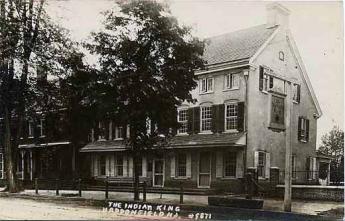 Haddonfield is a bit of a secret. It's Philadelphia's "Main Line, East"
Haddonfield is a bit of a secret. It's Philadelphia's "Main Line, East"
Nobel Prizes
Some Philadelphians won Nobel Prizes for work done here, or elsewhere. Some prize winners would deny they are Philadelphians, but their work was nevertheless done here.
Right Angle Club 2009
The 2009 proceedings of the Right Angle Club of Philadelphia, beginning with the farewell address of the outgoing president, John W. Nixon, and sadly concluding with memorials to two departed members, Fred Etherington and Harry Bishop.
What To Do If You Have a Heart Attack
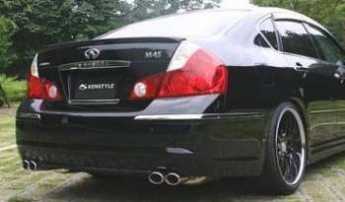
|
| No Ambulance, But Faster |
On a pleasant Spring Sunday some time ago, I was at home, doing nothing in particular, when I suddenly experienced severe, crushing pain deep inside my chest. No doubt in my mind what that meant, so I quickly took an aspirin and looked at the clock: 6:50 PM, daylight time. Out the window to my right, my neighbors were having a yard party, so I walked thirty feet over to them. Side-stepping the big Hollywood hello, I told my neighbor I was having a heart attack and would please like a fast trip to the hospital. There was some talk of calling an ambulance, but that was brushed aside. No time.
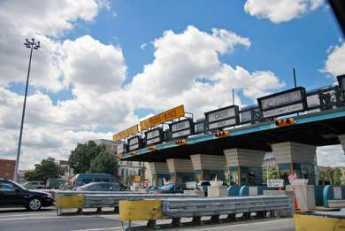
|
| E-Z Pass Speeds the Trip |
Neighbor Charlie took the wheel, a friend got in the back seat, and off we went, fast. About that time, I started to sweat, just like they say in books, but to my surprise only after two or three minutes of the pain. The pain continued unchanged. Luckily, on Sunday evening, traffic was light. Down the main road to Benjamin Franklin Bridge, through the gate with E-Z Pass, over the bridge, turn left. I asked the man in the back to call the Emergency Room on his cell phone to tell them I was coming in, please get the cardiac intervention team to come to meet me at the hospital in a few minutes. We made one wrong turn on a one-way street, adding three blocks to the ride. I knew better but didn't feel equal to protesting. We were soon at the right door, and then into the reception area of the Emergency Department. This area is almost brand new; the first time I had been there. But I had been all over that hospital every day for years at a time, and for two years had been the Physician in charge of the Emergency Room, myself.
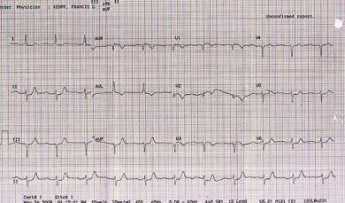
|
| Electrocardiogram |
I didn't recognize the nice lady at the desk, who wanted to know my next of kin, Medicare number, other insurance coverage, the color of my eyes, the name of my dog. My companions are very large fellows, and I was about to tell them to be polite, but if necessary knock her down, when actually I said the magic words,"Severe chest pain". That was part of her standard protocol, apparently, since I was immediately ushered onto a stretcher through a side door, had an electrocardiogram, watched the resident pick up the phone to call the cardiac team. Then I waved off somebody's informed consent speech to the effect that I didn't just consent to, but in fact, demanded an angioplasty. My clothes were taken away, intravenous lines were placed, ice-cold antiseptics were swabbed around. I was shaved in a business-like way in what the lady cutely called a Mohawk. The surgeon appeared, started his own informed consent speech which was waved off. The locks on the wheels were kicked loose, the stretcher started for the elevator, surrounded by scrambling attendants holding bottles. When we came to rest under a big light in some ceiling, I looked at the large wall clock. It was 7:20 PM. That was exactly thirty minutes after the pain began.
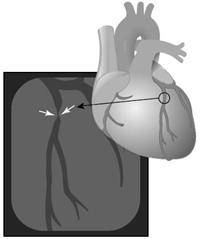
|
| Cardiac Catheter |
I was more or less awake during the whole procedure, getting to watch the dark black line of the catheter moving around on the scope beside me. I didn't know this particular surgeon, but it was obvious he was good. Usually, you can watch the catheter tip advance, then pull back, try again, pull back, try again and hit an obstacle. This evening I had the joy of watching a virtuoso performance, with the catheter smoothly advancing to its destination, twist and come to rest. Black dye squirted out, outlining the artery and its branches. The electrocardiogram correctly predicted the obstruction in the right anterior descending artery, and to general relief, the other atrerieswere "clean".
Probably because I got there so fast, plus swallowing an aspirin at home and chewing several in the Emergency Room, no clot had formed around the obstruction, which apparently was caused by a plaque of cholesterol with a split in it occluding the wall of the artery by bulging into the lumen. There seemed to be no clot behind the plaque or in front of it. The catheter had a stent over the balloon tip, which is to say it contained what amounted to braided chicken wire. The whole contraption gets opened up by inflating the balloon, then deflating and withdrawing it, which allows the artery to be held open by the unfolded chicken wire which remains in place. With the early versions of stents, fibrous scar tissue would grow over the chicken wire and block up the artery a few weeks later. Hence, the stent was coated with a chemical which prevents fibrosis. Unfortunately, this chemical also retards the growth of cells which line an artery on the inside, so coated chicken wire provokes clots. While I was still in the operating room, the solemn incantation was begun: I must take an anti-clotting drug every single day for a whole year, and if I missed a single pill, I could immediately die. I was to hear this incantation twenty times, so I guess they really mean it.
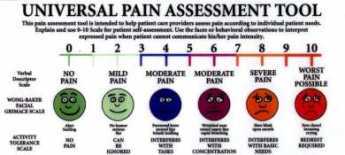
|
| On a scale from 1-10, how bad is it? |
Well, I was asked to call out a number from one to ten, indicating severity of chest pain. It had been "three" when I got to the operating room, even though it had begun as a "seven", and rose to "seven" several times during the procedure. Seven was my own invention; if I had to ask for pain-killer it was going to be an eight and would get to nine if I had to cry out. It never got worse than seven. When they pulled the catheter out of my groin, it was zero. It has stayed zero ever since.
It was a cause of some interest that my enzymes never rose. When heart muscle is injured, characteristic enzymes leak out and appear in blood tests; you can more or less measure the extent of the damage by the level it reaches. I had reached the emergency room so quickly the enzymes had not had a chance to rise. And the artery was re-opened so soon, they never did rise. For the first time in my life, my blood pressure was 250, so I guess I wasn't as calm as I let on. Somewhere during the procedure, the sweating stopped.
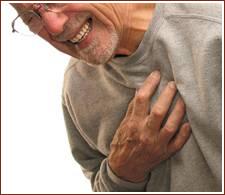
|
| Severe chest pain |
So, off to the cardiac care ward, where the custom is for each attendant to write his or her name on a whiteboard, while the date and time are prominently displayed for continuing orientation. They give you a phone so you can call your nurse, but my suggestion is to offer earplugs to drown out the continuous chatter at the desk. A patient of mine once called it the Racket Club. The food is, well, hospital food. Protocol says it should have no salt. I discovered that breakfast arrives on the dot at 9 AM, supper on the dot at 5 PM, lunch somewhere in between. I believe I understand the reasoning. Two days of this, and I'm discharged. Nothing to it, if you get there fast. Let me repeat, if you get there fast.
Since this light-hearted day trip is in sharp contrast with the six weeks of strict bed rest so routine in the days of my internship, not to mention the considerable mortality and disability that prevailed until quite recently, it justifies some reflection. As a medical student, I knew Andre Cournand and Dickenson Richards, who perfected the cardiac catheter. They were awarded Nobel Prizes, as was Michael Brown, who invented the statin drugs to lower cholesterol. Affable and modest men, they have saved millions of lives, now including mine. Or at least they did so, with the assistance of thousands of other doctors who perfected one by one the details of the little minute we danced in the operating room, each adding some little refinement, or eliminating some little hindrance to success. But, doggone it, you have got to get to the hospital fast.
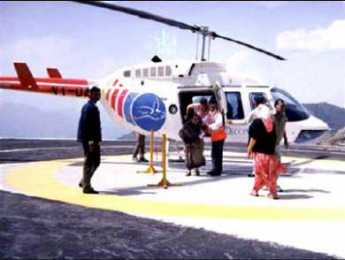
|
| Helicopter Dreams |
To do that, you have to give it some thought in advance; some community organization would also be useful. In my case, waiting for an ambulance would have slowed me down. Not everybody can live within a few minutes fast drive of a hospital, and not all hospitals are equipped to handle such cases. The range of effective rescue could be extended with helicopters, but you have to give some thought to where you would have to drive to find a place for a helicopter to land. Philadelphia is almost unique in having the largest evacuation company in the world, headquartered in Trevose, but it would take a lot of negotiation to arrange a system for the whole Philadelphia area. It just happens my oldest son was helicoptered off a mountain in Nepal this year (by an affiliate of this company), but his helicopter almost ran out of gas. These things can be done, and yearly evacuation insurance is about $200 a year, anywhere in the world. But it would take an awful lot of community planning and argue -- and maybe suing -- to make it happen. Is it worth it? Sure, but a little hard thought in advance might offer better solutions for most people.
Originally published: Tuesday, April 14, 2009; most-recently modified: Friday, June 07, 2019
| Posted by: Healthcoach | Feb 10, 2011 5:52 AM |
| Posted by: bzpaul | Apr 20, 2009 1:14 PM |
Thanks.